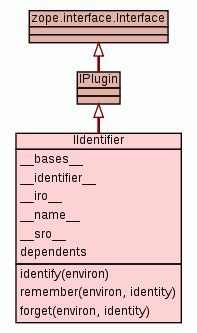
| Home | Trees | Indices | Help |
|
|---|
|
|

On ingress: Extract credentials from the WSGI environment and turn them into an identity.
On egress (remember): Conditionally set information in the response headers allowing the remote system to remember this identity.
On egress (forget): Conditionally set information in the response headers allowing the remote system to forget this identity (during a challenge).
|
|||
|
|||
|
|||
|
|||
|
|||
_InterfaceClass__attrs = |
|||
__bases__ = |
|||
__identifier__ = |
|||
__iro__ = |
|||
__name__ = |
|||
__sro__ = |
|||
_implied = |
|||
dependents = <WeakKeyDictionary at 27503432>
|
|||
|
Inherited from |
|||
|
|||
On ingress:
environ -> { k1 : v1
, ...
, kN : vN
} | None
o 'environ' is the WSGI environment.
o If credentials are found, the returned identity mapping will
contain an arbitrary set of key/value pairs. If the
identity is based on a login and password, the environment
is recommended to contain at least 'login' and 'password'
keys as this provides compatibility between the plugin and
existing authenticator plugins. If the identity can be
'preauthenticated' (e.g. if the userid is embedded in the
identity, such as when we're using ticket-based
authentication), the plugin should set the userid in the
special 'repoze.who.userid' key; no authenticators will be
asked to authenticate the identity thereafer.
o Return None to indicate that the plugin found no appropriate
credentials.
o Only IIdentifier plugins which match one of the the current
request's classifications will be asked to perform
identification.
o An identifier plugin is permitted to add a key to the
environment named 'repoze.who.application', which should be
an arbitrary WSGI application. If an identifier plugin does
so, this application is used instead of the downstream
application set up within the middleware. This feature is
useful for identifier plugins which need to perform
redirection to obtain credentials. If two identifier
plugins add a 'repoze.who.application' WSGI application to
the environment, the last one consulted will"win".
|
On egress (no challenge required): args -> [ (header-name, header-value), ...] | None Return a list of headers suitable for allowing the requesting system to remember the identification information (e.g. a Set-Cookie header). Return None if no headers need to be set. These headers will be appended to any headers returned by the downstream application. |
On egress (challenge required): args -> [ (header-name, header-value), ...] | None Return a list of headers suitable for allowing the requesting system to forget the identification information (e.g. a Set-Cookie header with an expires date in the past). Return None if no headers need to be set. These headers will be included in the response provided by the challenge app. |
|
|||
_InterfaceClass__attrs
|
__iro__
|
__sro__
|
_implied
|
| Home | Trees | Indices | Help |
|
|---|
| Generated by Epydoc 3.0.1 on Thu Jun 3 10:41:54 2010 | http://epydoc.sourceforge.net |